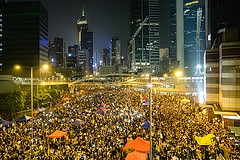Oct
8
2014

Written by Tina Law
Growing up, my dad often introduced himself as being “Hong Kong people.” The first thing he wanted you to know was his name; the second thing was that he was from Hong Kong. Being from Hong Kong was an enormous source of pride for him, and he frequently spoke about the “Hong Kong way” of doing things and shared with any and all people his many fond memories of this cosmopolitan island. As a kid and being second-generation, I never quite understood why this distinction was so important to him. But with the protests in Hong Kong over the past few weeks and hearing the consistent chants for “Hong Kong People! Hong Kong People! Hong Kong People!”—I think I get it now.
For the past several weeks, thousands of Hong Kong residents have been leading demonstrations throughout the city, focusing in particular on the city’s main government and business districts. These activists are fighting for full voting rights—namely, the right to elect their own city leader. This comes as a direct response to China’s recent rejection of proposed electoral reforms, a decision which maintains a city leader election process that is functionally controlled by a candidate nomination committee stacked with Beijing loyalists. In a broader sense, however, the protests are not just a fight for voting rights; rather, they are a fight for free speech, responsive and accountable government, meaningful inclusion of working class residents in local decision-making processes—all core elements of a democratic tradition that many Hong Kong people have come to identify with and that they now feel are slowly being eroded.
These protests share many similarities with movements we’ve seen here in the U.S. For one thing, many of the demonstrations in Hong Kong are being led by young people, including 17-year-old Joshua Wong who has emerged as prominent leader in the protests. Joshua Wong and his fellow leaders join a long line of youth activists who have played key roles in catalyzing and leading important social justice movements, including the Student Non-Violence Coordinating Committee during the Civil Rights Movement and the DREAMers in recent protests calling for comprehensive immigration reform. The protests in Hong Kong also draw upon a rich tradition of using physical intervention tactics to bring attention to issues and to pressure the-powers-that-be to respond to demands. Protesters in Hong Kong have been braving tear gas, arrests, and assaults from pro-Beijing advocates to physically occupy core areas in the city in an effort to disrupt business-as-usual, similar to Columbia University students’ week-long occupation of campus buildings in the 1960s to protest the Vietnam War and to the Dream Defenders’ recent month-long sit-in at the Florida State Capitol to call for changes to the state’s “Stand Your Ground” law.
Like many important movements, the protests in Hong Kong also introduce new innovations in social justice activism. For instance, social media has been a crucial tool for pro-democracy activists, which is particularly interesting given China’s Internet censorship policies. These activists have come to rely on FireChat—a messaging app that doesn’t involve cellular or wireless networks typical of messaging apps—to discuss, coordinate, and mobilize demonstrations in rapid fashion. Activists have also been projecting Tweets from supportive individuals from around the world onto the sides of skyscrapers in occupied districts. One photo, for example, shows a skyscraper wall cloaked with a Tweet from a supporter: “’Optimism is a strategy for a better future’ – Noam Chomsky.” While the role of social media in facilitating and bolstering social justice activism remains to be seen, these activists in Hong Kong may provide helpful cues on how to better leverage social media tools as a force for the greater good.
This Friday, pro-democracy activists in Hong Kong are scheduled to speak with key city officials. Many questions loom, including whether city officials will offer meaningful solutions, what activists will consider acceptable, and the paramount question that often confronts emerging social movements: how can activists sustain their momentum and continue to work together towards change? Nevertheless, it is clear that social justice activists—in Hong Kong and beyond—will have their eyes on this island, as much can be learned from these Hong Kong people and their “Hong Kong way.” Being a social justice activist and “Hong Kong people,” I know I will be paying attention.
Photo credit: Pasu Au Yeung via flickr
